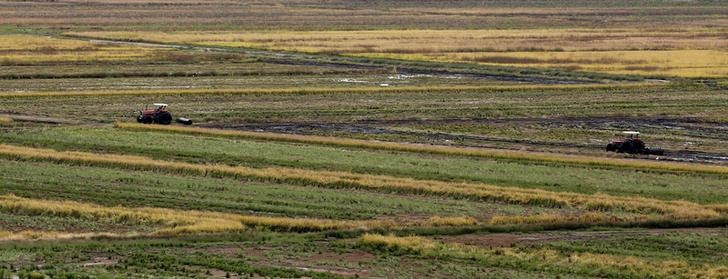(Bloomberg) -- In all, China could make almost $95 billion in additional purchases of American commodities as part of its trade deal with the U.S. The prospect is already drawing skepticism.
Most U.S. agricultural markets weakened Wednesday, with traders saying they need to see actual evidence of increases in shipments for prices to make substantial gains. American oil and natural gas prices were also lower.
U.S. President Donald Trump highlighted that the so-called phase-one deal signed in Washington will benefit farmers, a core voting bloc that he needs to appease to boost his re-election prospects. China has cut imports of American agricultural products during the long-running trade war between Washington and Beijing, roiling the economy in the nation’s farm belt.
“Given the numerous deals that have been reached and then breached in the past two years, we are also skeptical,” the National Farmers Union, which advocates on behalf of almost 200,000 American farm families, said in a statement. “And without more concrete details, we are deeply concerned that all of this pain may not have been worth it.”
China pledged to buy a total of $32 billion in agricultural products over the next two years, while it will also “strive” for another $10 billion. That includes oilseeds, meat, cereals, ethanol and cotton. It also promised an additional $52.4 billion in purchases of American energy such as liquefied natural gas, crude oil and coal over 2020 and 2021.
However, the terms of the latest deal don’t specify how much of each product China will buy. It also didn’t have details on whether the Asian nation will lift retaliatory duties it imposed on American products such as soybeans and LNG as part of the tit-for-tat tariff war.
“While China’s phase-one commitments are welcomed, U.S. pork exports continue to be suppressed because of the country’s 60% punitive tariffs,” National Pork Producers Council President David Herring said in a statement. “In order to fully capture the benefits of this deal, we need China to eliminate all tariffs on U.S. pork for at least five years.”
Soybeans futures in Chicago fell 1.2%, cotton slipped 1.1% and hog futures we down 0.4%. U.S. West Texas Intermediate crude is 0.4% lower, while natural gas fell 2.8%. The Bloomberg Commodity Index, which measures returns from raw materials, slipped 0.3% at 1:50 p.m. in New York.
“Signing the deal is the easy part,” Ken Morrison, a St. Louis-based independent trader, said by phone. “I have yet to hear a sound argument on how China will execute this deal.”
